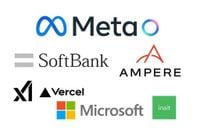Meta has officially launched its AI chatbot, Meta AI, across Europe after prolonged delays due to regulatory challenges. Starting this week, the service will be available in 41 European countries and 21 overseas territories, presenting a significant step for the tech giant as it navigates the complex landscape of European regulations.
The company had originally introduced Meta AI in the United States back in September 2023, and this rollout marks its first expansion outside the U.S. despite facing scrutiny from regulators worried about privacy and compliance with the European Union's strict data protection laws. Meta stated, "This launch follows almost a year of intensive engagement with various European regulators, and for now, we are only offering a text-only model in the region which wasn’t trained on first-party data from users in the EU," explained Meta spokesperson Ellie Heatrick to The Verge.
The chatbot supports six different languages: English, French, German, Italian, Portuguese, and Spanish. Users will interact with Meta AI through a new blue icon, which has been integrated into Facebook, Instagram, Messenger, and WhatsApp. The chatbot is activated by typing “@Meta AI” in group chats on WhatsApp, with plans for it to expand to Messenger and Instagram in the near future. Initially, however, the AI capabilities will be limited to text-based interactions.
Since its introduction in the U.S., Meta AI has gained over 700 million monthly active users, highlighting its importance to the company. Despite these promising figures, Meta faced an uphill battle in developing its chatbot for the European market due to regulatory complexities. The Ireland Data Protection Commission (DPC) raised concerns regarding user privacy and the legality of the AI’s training processes, effectively stalling the launch.
The initial idea to launch in Europe was paused last year when the DPC pointed out potential violations of user data privacy under the General Data Protection Regulation (GDPR). Meta's plans to use user-generated content from its platforms to train the AI were met with resistance. The DPC’s objections were a clear indication of the stringent controls that tech companies encounter in Europe.
Despite the concerns, Meta is still committed to enhancing its offerings in Europe. The current text-only model, devoid of features like photo generation or editing—functions available in the U.S. version—was a compromise to ensure compliance with existing regulations.
While the AI will initially function only in WhatsApp, users will soon be able to access it on Messenger and Instagram Direct Messaging. Users can ask Meta AI questions, brainstorm ideas, or seek information based on web searches, making it a versatile assistant within group chats.
As Meta enters the European market, regulatory scrutiny remains a significant focus. Recent reports indicate investigations into whether Meta's operations are fully compliant with the EU’s Digital Markets Act. Analysts suggest that more considerable fines may follow for non-compliance, similar to those imposed on other major tech companies.
U.S. President Donald Trump has also threatened tariffs in response to potential fining of American technology companies, citing unfair treatment by foreign markets, although officials in the EU insist they merely enforce regulations designed to ensure fair competition.
In light of the landscape, analysts have recently given a Strong Buy consensus on META stock, which reflects optimism about the company's potential performance. With an average price target of $763.71 per share, representing a 28.2% upside potential, the market appears to maintain confidence in Meta's long-term growth strategy.
Returning to the functional aspect of the chatbot, Meta AI will now help streamline user experience by allowing direct question-asking and obtaining answers that integrate both context and conversation design. For example, a user might request content related to specific locations or interests, and the assistant can instantly gather and present relevant results.
Impact on social interactions may also be significant. The possibility to integrate such an assistant into commonly used platforms like WhatsApp and Messenger will likely change the way users interact, promote shared experiences in real-time, and enhance the planning of social gatherings, trips, and collaborative projects.
Regulatory bodies within the EU continue to scrutinize Meta’s operations, particularly after the controversies surrounding data privacy breaches, as seen with the Cambridge Analytica scandal. The Irish DPC has pledged ongoing supervision in terms of how Meta handles user data and the chatbot's compliance.
As the launch progresses, Meta has expressed its desire to grow and evolve its AI offerings in Europe. The current plan is merely a starting point, and as the company collaborates with regulators, it hopes to introduce advanced features that match or exceed those currently available in the US.
"Our ambition is to make AI products available to more people around the world," said a company spokesperson, emphasizing the goal of broadening access to AI capabilities beyond current limitations.
In summary, the arrival of Meta AI in Europe, despite its restrictions and the careful approach taken toward user data, signifies a critical development in how artificial intelligence can be integrated with social media platforms. It lays the groundwork for future innovations, allowing Meta to navigate the complexities of privacy laws while simultaneously expanding its influence and technological capabilities worldwide.




